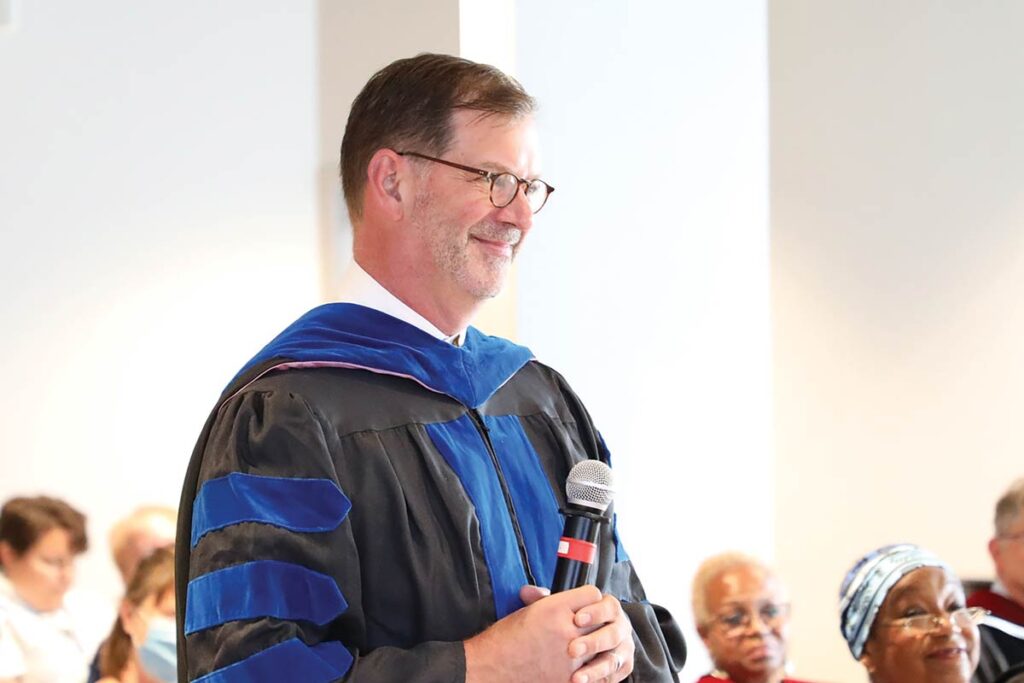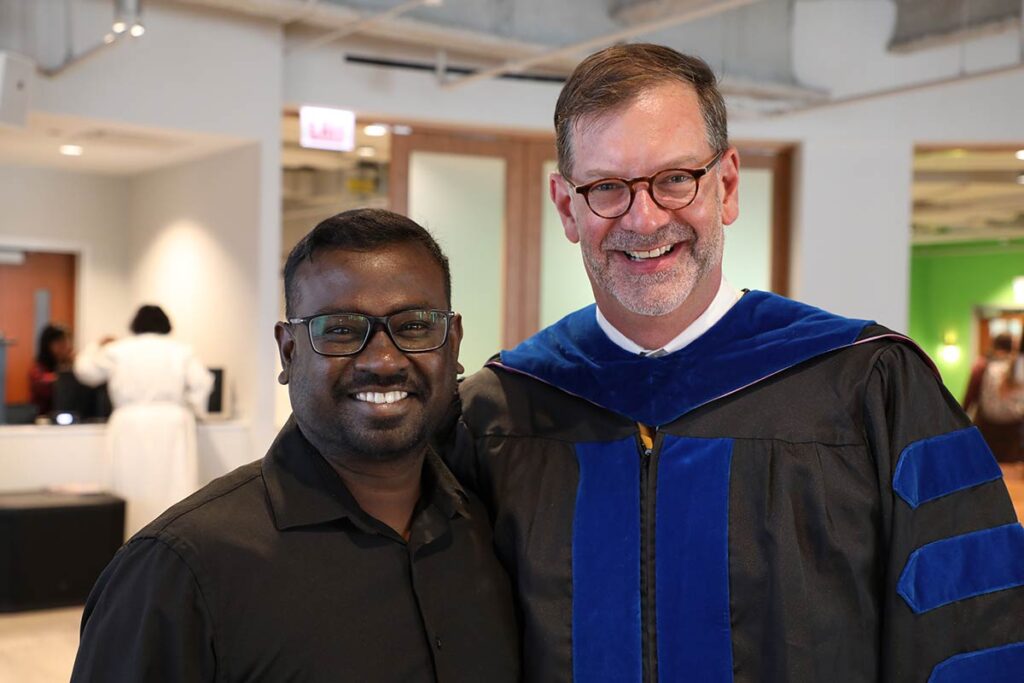Creating New Pathways for Innovation in Theological Education
By Alisha Green

Over the last three decades, Rev. Dr. Christian Scharen has seen a precipitous decline in the church and theological education. Younger people in particular have shown increasingly high rates of disaffiliation. These discouraging trends sparked Scharen’s ongoing research journey to seek new approaches and innovation with forms of church and theological education.
“One of the questions for me was, if the traditional way the church functions is working for fewer and fewer people, then what do we do? What’s an alternative? It quickly made me interested in what has been called ‘fresh expressions of church,’” said Scharen, who is Associate Professor and Gordon Braatz Chair of Worship at the Lutheran School of Theology at Chicago.
Scharen went looking for answers in his research. He wanted to understand where the Holy Spirit stirs up disruptive new forms of Christian community — like the “Wild Church Network” congregations that worship in nature and do environmentally focused activities together — and go beyond struggling “business as usual” models.
Through his work studying emerging churches, Scharen brought two ongoing grants with him when he joined LSTC in July 2024, both related to changing theological education by paying attention to experimental communities and understanding how to meet their leadership needs. In August 2023, he was awarded a four-year, $1.25 million grant for Pilot Studies of the Church’s Future as part of the Lilly Endowment Compelling Preaching Initiative. It focuses on fostering networking and peer-to-peer learning for new experimental communities.
To inform that networking and learning, Scharen recruited a cohort of 25 faith communities around the country affiliated with the Evangelical Lutheran Church in America. A central theme he has heard so far in talking with people in new experimental communities is that they often feel alone in what they are doing.
“They don’t know who else is doing that kind of experimentation, and they really want opportunities to gather and learn from each other,” Scharen said.
Scharen is already making connections among the communities.
“It is inspiring to connect with and see the ways in which these communities are finding their gifts and organizing around sharing those gifts,” Scharen said. “They’re really responding to the time we’re living in in beautiful ways.”

Scharen was then awarded an 18-month, $50,000 grant in November 2023 from the Missional Church Leadership Formation Network as part of the Lilly Endowment-funded Ministry in the City Hub Initiative at City Seminary of New York City. Scharen brought that grant with him when he joined LSTC last year, working with Vice President for Enterprise Innovation Keisha Dyson and a market research firm to host a series of focus groups with experimental communities last fall. Findings from these focus groups will support development of new educational offerings by LSTC, including such topics as adaptive leadership, social entrepreneurship, nonprofit management, trauma-informed practice, and experimental resources for worship and music.
Most recently, LSTC was awarded a $50,000 planning grant from the Lilly Endowment’s Pathways for Tomorrow Initiative last fall. That grant, written by Scharen and President emeritus James Nieman, is focused on strengthening and sustaining institutional capacities to prepare and support pastoral leaders for Christian churches. The planning grant will help with writing a subsequent $1 million implementation grant from the same initiative, which LSTC will submit this May.
“The Lilly Endowment wants to support initiatives that strengthen seminaries so they can be durable institutions into the future and support the well-being of the church. That means seminaries that are financially stable, programmatically stable, and stable in terms of mission and vision,” Scharen said.
The new Lilly Endowment planning grant will fund several months of work overseen by LSTC Vice President Dr. Linda Thomas, Scharen, and others at LSTC with a goal of “recentering the community of accountability for the seminary,” as the grant proposal put it. Thomas is Dean of Academic Affairs at LSTC, Director of the Rev. Dr. Albert “Pete” Pero, Jr., and Rev. Dr. Cheryl Stewart Pero Center on Intersectionality Studies, and the Bernard, Fischer, Westberg Distinguished Professor of Theology and Anthropology.
“Historically, the community of accountability for LSTC has been the denomination, or the Evangelical Lutheran Church in America,” Scharen said. They provided parameters for training pastors for the church who could serve in any given community; pastoral leaders were seen as easily interchangeable from one place to another.
“We’re trying to shift that, so the community of accountability is the communities from which students come and the communities to which they are sent as leaders in the church,” Scharen added. “We want to move from thinking about training an individual leader for a community to supporting leadership formation for communities over time, helping support and form the work they’re doing.”
The shift involves deep listening to understand more about the specific leadership needs of local communities, then developing an education centered on the skills their leaders need to meet that unique mission and vision.
Scharen said a mix of faculty and staff at LSTC are working on the effort. They will hold a series of conversations with experts on institutional leadership in theological education, along with gathering focus groups of people from faith-based organizing groups, Latiné ministries, and new experimental communities. They will listen to what those communities need and what kinds of leadership training would be most beneficial to helping them meet their goals.
“That will create a path for developing new initiatives that really center the learners, the communities, and the needs they have,” Scharen said. “It shifts our whole culture around who our communities of accountability are.”
If Lilly Endowment awards the larger implementation grant to LSTC, it would help LSTC pursue “a public church curriculum that is very aware of intersectionality” and meets people where they are, said Thomas.
“We know there are people with a lot of knowledge that comes from living their lives, and they have a robust spirituality,” Thomas said. “So what would it mean if theological education was open to everyone at whatever level they are educationally?”
That intersectional approach would empower pastoral leaders to better connect with a diverse range of communities and lived experiences, such as people who have disabilities or are experiencing homelessness.
“All people are blessed with being children of God and are called to have access to equality and equity. The grant will help us to pursue those wrapped up in a curriculum,” Thomas said.
Thomas added that, given the rapid pace of change, “we have to pay attention to it and be open to different ways of teaching.”
Across all of the grants, the efforts help assess what is on the horizon for how people are gathering in meaningful Christian community or spiritual community.
Currently, LSTC offers few resources these communities say they need, and those they offer are inaccessible to all but a few. “These grant projects are helping us understand how we can better partner with them and offer the resources they say they need in the most accessible forms possible,” Scharen said.